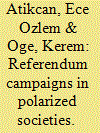| Srl | Item |
| 1 |
ID:
134596


|
|
|
|
|
| Summary/Abstract |
This paper evaluates external factors that shape the establishment of transparent institutions, with a focus on the work of the Extractive Industries Transparency Initiative in Azerbaijan. The evidence from Azerbaijan suggests that in hydrocarbon-rich countries, genuine reform can only be achieved through the combined efforts of external and domestic actors. More specifically, the paper argues that transparency promotion from abroad relies on the existence of political accountability and genuine anti-corruption measures in order to work as intended. The case of Azerbaijan illustrates the potential limitations of external remedies to the ‘resource curse’ and emphasises the significance of accountability in political regimes.
|
|
|
|
|
|
|
|
|
|
|
|
|
|
|
|
| 2 |
ID:
116408


|
|
|
|
|
| Publication |
2012.
|
| Summary/Abstract |
Can referendum mechanism be used in deeply polarized societies without invoking existing cleavages? This question is tackled by studying two recent Turkish constitutional referenda, which took place in 2007 and 2010. Turkish society and politics are highly polarized along the secular versus pro-Islam axis. Based on an in-depth study of the campaign materials, media content analysis, and survey data from both cases, it is demonstrated that although both referendum proposals were related to secularism in Turkey, this cleavage was more visible in the 2010 vote. If political parties choose to treat referenda as elections, voters' predispositions are more likely to be reinforced, and partisan voting is more likely to prevail. This research shows that controlled comparisons help in understanding the role of party politics in direct democracy.
|
|
|
|
|
|
|
|
|
|
|
|
|
|
|
|
| 3 |
ID:
149901


|
|
|
|
|
| Summary/Abstract |
In the last decade, the Extractive Industries Transparency Initiative (EITI) has grown in both popularity and influence. The ascendance of EITI is surprising because traditionally, leaders of resource-rich states prefer to tightly control their extractive industries. This paper investigates the underlying causes of EITI membership in order to understand its acceptance, even among some of the most authoritarian regimes. The paper argues that leaders of resource-rich countries use the EITI to consolidate their international prestige as eager reformers, which serves to both maintain and lure foreign investment. The cross-national and interrupted time series analyses reveal that EITI members not only have higher FDI levels compared to non-members, but these investments increase once countries join the initiative.
|
|
|
|
|
|
|
|
|
|
|
|
|
|
|
|